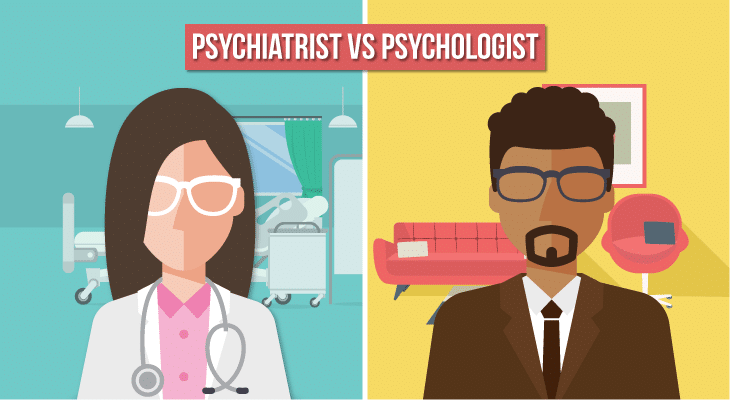What is the difference between psychologists and psychiatrists?

In the realm of mental health therapy, individuals often seek assistance from professionals who specialize in understanding and treating various psychological issues. Psychologists and psychiatrists are two distinct yet interconnected fields that play crucial roles in promoting mental well-being. This article aims to explore the disparities between psychologists and psychiatrists, shedding light on their unique roles, qualifications, and approaches to mental health care.
Education and Training
- Psychologists: Psychologists typically obtain a doctoral degree (Ph.D. or Psy.D.) in psychology, involving extensive coursework, research, and practical experience. Their education emphasizes a deep understanding of human behavior, emotions, and cognitive processes.
- Psychiatrists: In contrast, psychiatrists are medical doctors who specialize in psychiatry. They undergo medical school, earning an M.D. or D.O. degree, followed by residency training in psychiatry. This medical background allows them to diagnose and treat mental health issues using a combination of psychotherapy and medication.
Approaches to Treatment
- Psychologists: Psychologists primarily focus on psychotherapy or talk therapy. They employ various therapeutic techniques to help individuals understand and manage their thoughts, emotions, and behaviors. Psychologists may specialize in different therapeutic modalities such as cognitive-behavioral therapy (CBT), psychodynamic therapy, or humanistic therapy.
- Psychiatrists: Psychiatrists have the authority to prescribe medication, in addition to providing psychotherapy. Their treatment approach often involves a combination of medication management and therapy, aiming to address both the biological and psychological aspects of mental health conditions.

Scope of Practice
- Psychologists: Psychologists work in diverse settings, including private practices, schools, hospitals, and research institutions. They assist clients in coping with stress, improving relationships, and managing mental health disorders without prescribing medication.
- Psychiatrists: Psychiatrists often work in hospitals, clinics, or private practices. They specialize in the diagnosis and treatment of severe mental illnesses, such as schizophrenia, bipolar disorder, and major depressive disorder, where medication intervention is frequently necessary.
Collaboration
- Psychologists: Collaboration with other mental health professionals, such as social workers, counselors, and psychiatric nurses, is common for psychologists. They often work within a multidisciplinary team to provide comprehensive care.
- Psychiatrists: Psychiatrists may collaborate with psychologists and other healthcare professionals, especially when a combination of therapeutic approaches is deemed beneficial for the patient.
Patient Interaction
- Psychologists: Psychologists typically spend more time engaging in direct one-on-one or group therapy sessions, building strong therapeutic relationships with their clients.
- Psychiatrists: Psychiatrists often have shorter appointment times, focusing on medication management and monitoring the biological aspects of mental health conditions.
In essence, while psychologists and psychiatrists share a common goal of promoting mental well-being, their approaches, education, and roles in the healthcare system differ significantly. Understanding these distinctions is essential for individuals seeking mental health support, as it helps them make informed decisions about the type of professional assistance that aligns with their needs. Both psychologists and psychiatrists contribute valuable perspectives to the field, working together to address the diverse challenges of mental health.
Psychologists primarily focus on psychotherapy and counseling, utilizing talk therapy to help individuals cope with emotional and behavioral issues. Psychiatrists, on the other hand, are medical doctors who can prescribe medications and often integrate medication management with therapy.
Yes, they do. Psychologists typically have a doctoral degree in psychology (Ph.D. or Psy.D.), which involves extensive training in research and clinical practice. Psychiatrists are medical doctors who complete medical school and then specialize in psychiatry during their residency.
In most places, psychologists cannot prescribe medication. Only psychiatrists, as medical doctors, have the authority to prescribe drugs to treat mental health conditions.
Psychologists offer psychotherapy, counseling, and various therapeutic interventions. Psychiatrists provide a range of treatments, including medication management, psychotherapy, and other medical interventions for mental health disorders.
If you prefer non-medication approaches and want to focus on talk therapy for emotional and behavioral issues, a psychologist may be a good choice. If you think medication might be necessary for your condition or if you prefer an integrated approach combining therapy and medication, a psychiatrist may be more appropriate.
A psychologist can help you explore and address your concerns through therapy. If your symptoms are severe, persistent, or require medication, a psychiatrist may be better equipped to assess and prescribe the appropriate treatment.
Yes, collaborative care is common. In many cases, individuals receive both therapy from a psychologist and medication management from a psychiatrist. This collaborative approach aims to address mental health concerns comprehensively.
Mental health stigma can affect both psychologists and psychiatrists. However, attitudes are changing, and seeking help for mental health concerns is increasingly viewed as a positive and proactive step toward overall well-being.
Insurance coverage varies, but both psychologists and psychiatrists may be covered by insurance plans. It's important to check with your insurance provider to understand the specific details of your coverage.
Expat Psychologist service
Articles
See all